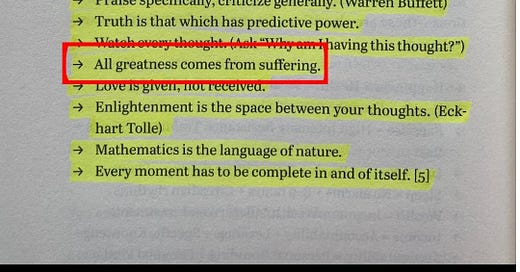In 1974, Naval Ravikant moved from India to New York City.
21 years later, he raised $45 million for his company.
You might know Naval already. If so, skip the bullets and go to the picture below.
If not, here’s why he’s worth listening to:
• Co-founded AngelList, a leading startup/investor platform
• Early-stage investor in Uber, Twitter, Postmates, and more
• Considered a prominent “philosopher-investor”
• Millions of followers on social media
• Smart.
• Like, really smart.
In a world full of shysters and empty-calorie advice dispensers, Naval Ravikant is the opposite.
Here are his “Rules”:
“All desire is suffering.”
“All greatness comes from suffering.”
So wouldn’t it stand to reason that greatness is downstream from desire?
Last week, I wrote about my theory that Millennials are unhappy due to a disconnect between reality and their expectations.
So here’s where you say:
“Ha! Just one week later and you’re contradicting yourself. Didn’t you just say that desire was the root of unhappiness?”
There’s a key difference here, of course. Expecting greatness sets you up for inevitable disappointment. But desire — wanting things — is a necessary part of a happy life.
Need proof?
It’s literally written in the stars.
The word “desire” comes from the Latin de sidere. “De” meaning “down from” and “sidere” coming from “sidus,” meaning “the stars.”
Desire — the things you want, wish, and long for — are divinely inspired. They come from the stars — from God.
When we say desire comes “from the stars,” we’re not just being idealistic hippies sharing revelations over a Peter, Paul, and Mary album. We’re touching on something concrete. Ancient sailors used celestial navigation. Why? Because the stars were constant.
Desire, with its roots in the sky, is a north star for your life — a path to guide you when you’re not sure where to go next.
But, of course, there’s a catch.
If left unchecked, desire turns into pure hedonism — chasing every whim and pleasure — and ultimately leading nowhere.
But shutting down desire completely is like trying to navigate without looking up at the stars checking your GPS.
The paradox of desire, then, is that it can be both your biggest source of suffering and your surest path to greatness.
The key is to distinguish the difference between fleeting cravings and deep pulls from your gut. One is a guide. The other is a siren.
So, of course, the logical question:
How do you know which is which?
What’s a true desire worth following?
What’s a short-term siren song luring you in to crash on the rocks?
I think the key to identifying a real desire is finding the things that take work. The harder something is to get to, the more meaningful the journey is.
On the flip side, fleeting cravings are the things that offer short-term satisfaction — but almost always lead to regret.
For me, it’s simple:
“Will this matter to me in 5 years? Will I still want it in 10?”
If yes, it’s a desire.
And if yes, it’s worth pursuing.
Which brings us back to Naval’s paradox.
All desire is suffering …
Yet all greatness comes from suffering.
So is desire the catalyst for greatness?
It’s a big question to answer. And probably a little different from person to person.
But one thing is universally true:
While all desire might lead to suffering, only some suffering leads to stars.
(Ha. You thought because last week’s post had hard data and cited sources that we were going to get away from the pseudo-motivational content. No such luck. That real stuff is hard to write.)





